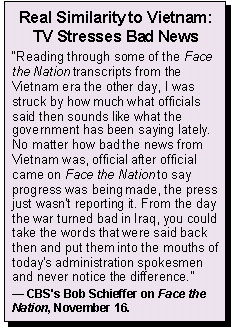 |
|||||||||
|
 |
||
|
 |
||||||||||||||||||||||||
|
||||||||||||||||||||||||
 |
||||||
|
||||||
 |
||||||
|
 |
||||||||||||||||||
|
||||||||||||||||||
 |
||||||||||||||||||||||||
|
||||||||||||||||||||||||
 |
||||||||||||||||||
|
||||||||||||||||||
|
|
|
For Immediate Release: Katie Wright (703) 683-5004 - Monday, November 17, 2003

Hardball's Week of Reporting Included Genuinely Good News Most Americans Have Never Heard
MSNBC's Arnot Balances Dismal The major problem during Vietnam, you'll hear journalists say, is that public debate about the war was skewed by the Johnson administration's erroneous happy talk. When reporters like CBS anchor Walter Cronkite began giving sour reports about the state of the war effort, the public's support inevitably evaporated.
As in any war, there has been a lot of terrible, painful news coming out of Iraq this year. But MSNBC's Hardball last week featured five days of in-depth reporting from Chief Foreign Affairs Correspondent Bob Arnot that went beyond the knee-jerk negativity of everyday network news: • November 10: Arnot took his cameras to a Baghdad shopping district which bore no resemblance to a war zone: "Look at this," he instructed host Chris Matthews as he stood in the center of a wide boulevard. "They've even painted the flower and tree boxes by the side of the street." Arnot began exploring the stores: "Look at the quality of the shops. Now, gold you can get here for a very reasonable price. This is 21-karat gold. And they have beautiful necklaces, bracelets, rings here, high quality. Security is good enough that they can leave this window open." • November 11: Arnot visited a town in the Sunni triangle, the region which has been most dangerous for American forces, and showed how the Army works with local leaders to enact improvements: "Colonel [Nate] Slate and his men have refurbished a water pump station, irrigation ditches and schools....Children used to drink filthy water from this ditch, many sick, some dying of dysentery. Now a new pipeline built by the Americans brings the village clean water." • November 12: Arnot traveled to a religious city west of Baghdad and heard complaints about the media's negative coverage. "The people of Kazimayah tell us that the picture painted by al-Jazeera and other Arab satellite stations is a bleak one of daily death and destruction. Kazimayah's leaders are so eager to show Iraq's real story that the ayatollah himself sends his top lieutenant." The city tour shows a thriving marketplace and U.S. soldiers at ease with Iraqis. • November 13: Iraq's industrial production won't reach pre-war levels until 2004, but the economic story isn't as bad as reported elsewhere, Arnot tells us: "People have money to spend because government salaries have gone up and Iraq's unemployment number is significantly lower than expected. It's not the 70 percent you've heard of; it could be lower than 20 percent." That 70 percent figure was cited repeatedly by ABC News the previous week. • November 14: "There's certainly a lethal insurgency trying to derail the birth of the new Iraq, running up the body count for the evening news," Arnot explained in his wrap-up piece. "But the new Iraq is being born nonetheless....The U.S. military, America's civil administrators and Iraq's peaceful majority are in the fight of their lives, a hot war that is far from decided. But it is not a lost war, nor a hopeless one. And that is the real story."
Home | News Division
| Bozell Columns | CyberAlerts |







 This time, the coverage suggests that reporters are bending over backwards to give the public a pessimistic portrait of the current U.S. mission in Iraq. Less than a week after the war started, on CBS's
48 Hours, Lesley Stahl raised the specter of the only war America lost: "You fought in Vietnam," she reminded Navy Secretary James Webb back on March 25. "Any feelings of deja vu?" Eight months later, CBS News is still pushing the public to see Iraq as another Vietnam. (See box.)
This time, the coverage suggests that reporters are bending over backwards to give the public a pessimistic portrait of the current U.S. mission in Iraq. Less than a week after the war started, on CBS's
48 Hours, Lesley Stahl raised the specter of the only war America lost: "You fought in Vietnam," she reminded Navy Secretary James Webb back on March 25. "Any feelings of deja vu?" Eight months later, CBS News is still pushing the public to see Iraq as another Vietnam. (See box.)